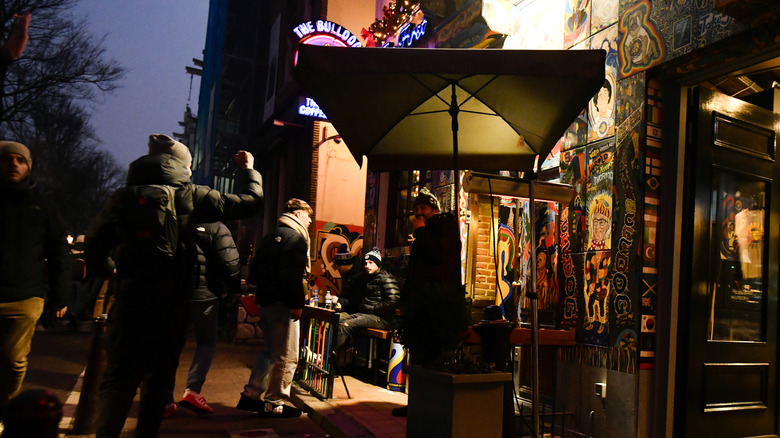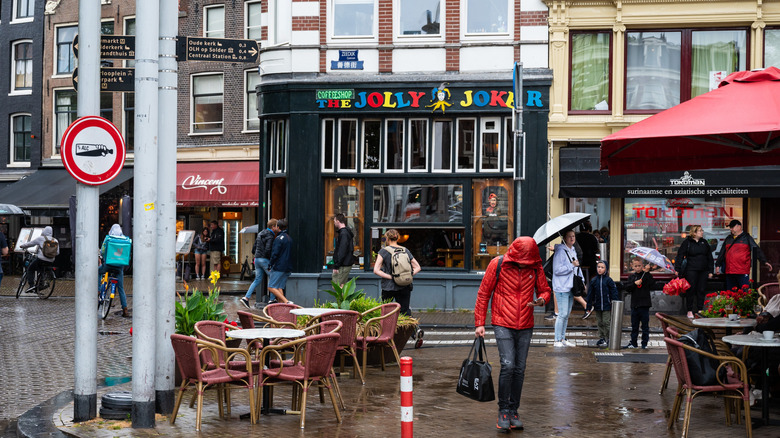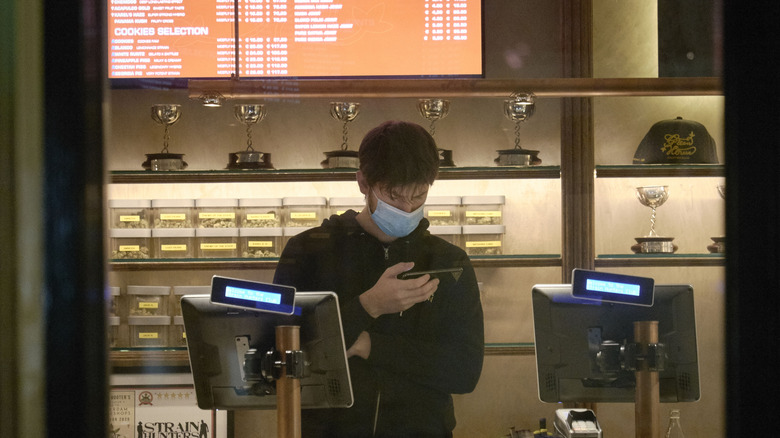The Surprising Difference Between Coffeeshops In Amsterdam Vs. America, Per Rick Steves
If you're looking for a fresh cup of coffee in the breathtaking and walkable city of Amsterdam, you might find yourself disappointed after walking into a "coffeeshop". While Amsterdam does have a vibrant coffee scene with plenty of specialty coffee roasters offering up unique flavors for caffeine enthusiasts, stores known as coffee shops cater to a different kind of enthusiast. They sell marijuana.
On his website, Rick Steves' Europe, the famous guidebook writer, TV host, and world traveler acknowledged that with widespread legalization (something Steves has actively campaigned for for years) finding a shop that sells cannabis openly is not the culture shock that it once was for visitors to Amsterdam. Going to a coffeeshop is still an experience you can only have while in Amsterdam, though. There are some key differences between the dispensaries common in the United States and the coffeeshops of Amsterdam. For one thing, smoking marijuana on the premises is legal and encouraged. Much like at a cafe that actually serves coffee, at an Amsterdam coffeeshop you're welcome to make your purchases, sit down, and relax while you enjoy them.
Why are Amsterdam's coffeeshops so different?
To understand the connection between coffee and cannabis in Amsterdam, you have to look back about three centuries. While it might seem unusual to travelers, the history of coffee culture in Amsterdam is unique and has left its mark on the city. Coffee became a popular product in Amsterdam in the early 1700s, with both wealthy elites and ordinary people. The government took advantage of this opportunity to make money and taxed coffee heavily, forcing smaller working-class coffee shops to go underground and serve coffee illegally without paying the taxes. The culture of these speakeasy-style coffee houses included gambling and billiards, closer to bars elsewhere.
While most of these secret coffee shops only lasted a few decades, those that remained started also selling alcohol as well as coffee, solidifying that these shops were about more than just a hot cup of coffee. According to a post from Rick Steves on his website, by the 1970s, some coffeeshops also started secretly selling illegal drugs. Today, cannabis is the most popular product in establishments known as "coffeeshops," but often they will still have coffee and snacks available for you to buy too — they're just not the star of the show. If you really are just looking to enjoy a cup of coffee, you're better off at a specialty coffee shop like excellent the FUKU Café where you can find a variety of different roasts to taste or the friendly Rub Baba which serves up unusual flavors.
Visiting Amsterdam's coffeeshops
Rick Steves says the prescription for culture shock is to embrace differences. Whether you decide that means that you want to visit one of the city's coffee shops (or coffeeshops), Rick Steves assures the readers of his website that there's very little risk of getting them confused. While they're technically not allowed to advertise cannabis products, it's pretty clear what they're selling. Many of them even have Bob Marley-inspired Rastafarian designs to clue you in. If you want to be sure, though, keep your eyes out for a green and white sticker in the window, designating it as a legal cannabis seller.
Once you're inside, make sure to actually ask the person behind the counter for the menu, if you don't see it clearly displayed. There are typically a lot of different varieties to choose from, but proprietors aren't supposed to offer it to you unless you specifically ask to see it. In some coffeeshops you can only see the menu by pressing a button that shines a light on it. It might seem unnecessarily complicated, but it's to ensure that they are complying with the city's laws. Just like actual coffee shops, some coffeeshops sell basic strains while others sell upscale varieties — but on his website, Steves warns that cannabis in Amsterdam is exceptionally strong compared to what American tourists may expect, so it's a good idea to pay attention to what you're buying. Tourists are known for accidentally using far more than they should without realizing it.


